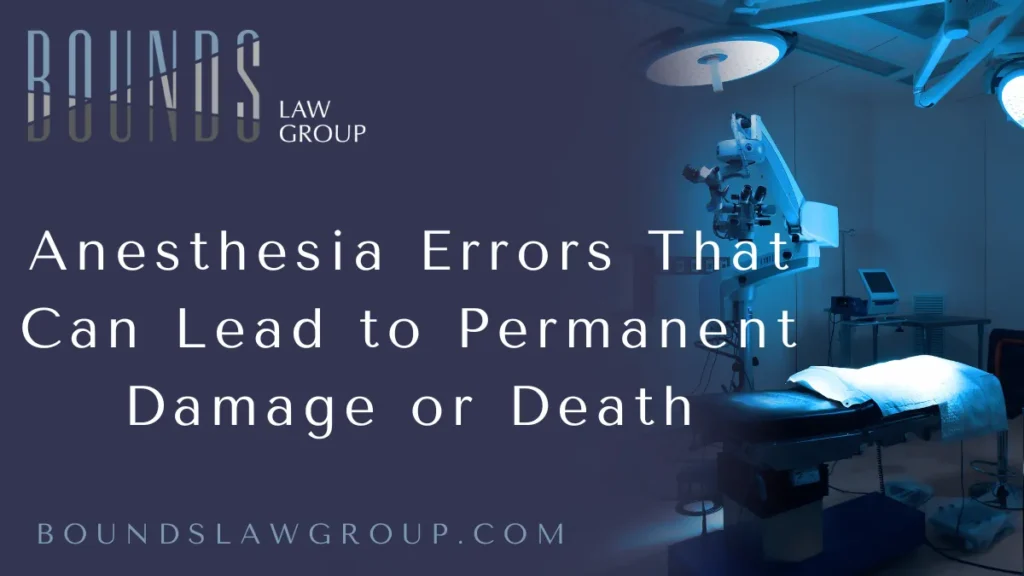
Anesthesia Errors | Bounds Law Group
When undergoing surgery or any medical procedure that requires anesthesia, patients place immense trust in the hands of medical professionals. Yet, anesthesia mistakes can have catastrophic consequences, including permanent brain damage, paralysis, and even wrongful death. At Bounds Law Group, we are committed to holding negligent parties accountable when anesthesia errors cause irreversible harm. If you or a loved one has suffered due to a preventable anesthesia mistake, our experienced anesthesia malpractice lawyer team is here to help.
Contact us now at 877-644-5122 or complete the free case evaluation form for expert legal assistance.
What Does an Anesthesia Malpractice Lawyer Do?
An anesthesia malpractice lawyer focuses on representing patients who have been harmed due to errors made during the administration of anesthesia. These legal professionals delve deep into medical records, analyze the standard of care provided, and uncover how negligence directly contributed to a patient’s injuries. At Bounds Law Group, our attorneys possess extensive experience in handling complex medical malpractice cases, especially those involving anesthesia-related incidents.

Common Types of Anesthesia Errors
Numerous things can go wrong during the administration of anesthesia. Each carries the potential for life-threatening outcomes. Below are some of the most common types of anesthesia malpractice that often lead to legal action:
1. Dosage Errors
Administering too much or too little anesthesia is one of the most dangerous errors an anesthesiologist can make. Overdose can lead to brain injury or death, while underdose may result in the patient becoming conscious during surgery, known as anesthesia awareness, often causing severe psychological trauma.
2. Delayed Delivery of Anesthesia
Timing is critical in any surgical procedure. Delays in administering anesthesia can cause a patient to experience pain, trauma, and surgical complications. These delays may result from poor planning, communication errors, or technical failures, all of which may constitute malpractice.
3. Failure to Monitor Vital Signs
A crucial responsibility of the anesthesiologist is to continuously monitor the patient’s heart rate, blood pressure, oxygen levels, and breathing during the procedure. Failure to observe vital signs and respond to dangerous fluctuations can result in hypoxia, brain damage, cardiac arrest, or death.
4. Intubation Mistakes
Improper intubation—placing the breathing tube incorrectly or failing to secure it—can block a patient's airway. This deprives the brain and organs of oxygen and may lead to permanent damage or even death within minutes.
5. Allergic Reactions or Drug Interactions
Anesthesiologists are responsible for reviewing a patient's medical history, current medications, and known allergies before administering any drugs. Neglecting this can cause fatal reactions, including anaphylaxis, and is a direct form of medical negligence.
What Can an Anesthesia Malpractice Lawyer Do for You?
If you suspect you or a loved one suffered injury due to an anesthesia error, a skilled anesthesia malpractice lawyer at Bounds Law Group can take the following actions on your behalf:
- Conduct a full investigation into the incident and gather medical records, surgical notes, and witness testimony.
- Consult with medical experts who can attest to deviations from standard care.
- Build a compelling case that links the anesthesiologist’s or hospital’s negligence to your injury.
- Negotiate settlements or take the case to trial to seek maximum compensation for your damages.
We provide free consultations and aggressively pursue justice for our clients.
Permanent Injuries Caused by Anesthesia Malpractice
The injuries resulting from anesthesia malpractice can be devastating and lifelong. Our team at Bounds Law Group has represented clients suffering from:
Brain Damage
Lack of oxygen to the brain during surgery can lead to hypoxic-ischemic encephalopathy, a condition that results in cognitive impairment, memory loss, speech issues, and loss of motor function.
Nerve Damage and Paralysis
Misadministration of regional anesthesia, such as spinal or epidural anesthesia, can damage the central nervous system and cause partial or total paralysis, chronic pain, or numbness.
Cardiac Arrest and Coma
Improper anesthesia dosage can cause cardiac complications, including fatal arrhythmias or cardiac arrest. Some patients fall into comas, from which they may never recover.
Death
In the most tragic cases, families lose a loved one due to anesthesia negligence. These cases often qualify for wrongful death claims, where our attorneys seek compensation for funeral costs, lost income, and emotional suffering.
Proving Negligence in an Anesthesia Malpractice Case
To prevail in an anesthesia malpractice case, your anesthesia malpractice lawyer must demonstrate:
- A doctor-patient relationship existed.
- The anesthesiologist breached the standard of care.
- The breach directly caused your injuries.
- You suffered damages as a result.
The legal and medical complexity of such claims makes it critical to work with an experienced team like Bounds Law Group, who understand both the law and the medicine involved.
Why Choose Bounds Law Group?
We are a trusted name in medical malpractice litigation, offering clients:
- Decades of combined legal experience.
- Proven results in complex malpractice cases.
- Access to top medical experts.
- Personalized, compassionate legal representation.
If you or a loved one has suffered due to anesthesia negligence, don’t delay. Complete our free case evaluation form or call us now at 877-644-5122 to speak directly with an experienced anesthesia malpractice lawyer.
Compensation You May Be Entitled To
Victims of anesthesia malpractice may receive compensation for:
- Medical expenses
- Lost wages and earning capacity
- Pain and suffering
- Emotional distress
- Long-term care and rehabilitation
- Wrongful death damages (for surviving family members)
Our attorneys at Bounds Law Group will fight for the full compensation you deserve.

Failure to Obtain Informed Consent Before Administering Anesthesia
Before administering any type of anesthesia—whether local, regional, or general—it is the legal and ethical duty of the anesthesiologist and surgical team to obtain informed consent from the patient. This is a critical step that protects a patient’s autonomy and ensures they understand the potential risks, side effects, and alternatives to the anesthesia being proposed. Failing to do so not only breaches medical standards but may also constitute anesthesia malpractice.
Informed consent must include:
- A clear explanation of the type of anesthesia to be used.
- Disclosure of common and rare risks, including potential for brain damage, paralysis, or death.
- An opportunity for the patient to ask questions.
- Alternatives to anesthesia or options for different types of sedation.
- Documentation that the patient understood and voluntarily agreed to the procedure.
When healthcare providers skip or rush this process, patients are left vulnerable—and often blindsided when complications arise. This lack of disclosure may lead to avoidable injury or trauma and creates a strong foundation for a medical negligence claim.
If you or a loved one was harmed after receiving anesthesia without fully understanding the risks, our legal team is ready to evaluate your case. Complete our free case evaluation form or call us now at 877-644-5122 to speak with an experienced anesthesia malpractice lawyer today.
Time Is Limited – Act Now
Every state has a statute of limitations for filing medical malpractice claims. Missing the deadline can bar you from recovering compensation. Contact our firm immediately to ensure your rights are protected.
Start Your Path to Justice Today
Your health, your life, and your future are too important to leave to chance. If anesthesia negligence has altered your life, the legal team at Bounds Law Group is here to help. Trust our skilled anesthesia malpractice lawyer team to guide you every step of the way.
👉 Complete our free case evaluation form or call us now at 877-644-5122 for immediate legal assistance.
Sources
- American Society of Anesthesiologists – Patient Safety and Risk Management
Offers detailed guidance on standard anesthesia practices and risks involved.
https://www.asahq.org - Johns Hopkins Medicine – Surgical Complications Related to Anesthesia
Comprehensive explanation of how anesthesia errors occur and potential complications.
https://www.hopkinsmedicine.org - National Institutes of Health (NIH) – Anesthesia and Perioperative Complications
Academic research and case studies on adverse outcomes related to anesthesia.
https://www.ncbi.nlm.nih.gov

